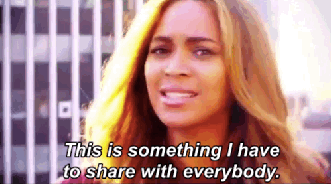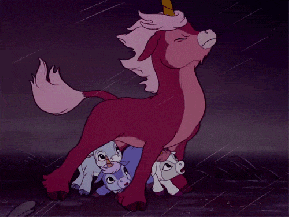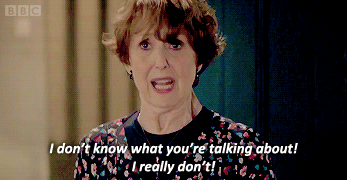I’ve been seeing a lot of resistance (negativity, misinformation, outright opposition) to the betareading process over the last few months, and . . . it upsets me.
I believe in the beta process the way toddlers believe in Bandaids. OK, so that’s a mediocre example. I believe in it like a good dog trusts its human.
Betas make books better, and better books make happier readers who will read more books. But what you get out of your beta, and where your story goes in revision, is up to you, not your readers.
If you’re worried a betaread will change your story, try following these five tips to run a successful beta to protect it (from others and yourself) while improving both the work and your craft.
1. State your vision for the work clearly, even if you don’t share the specifics with an audience.

This is the most important step, in my opinion. It can be as simple as “to entertain my readers with a fun adventure story” or as complex as “to inform readers about X and Y so that they walk away with a changed perspective on Z.”
Doing this will help you, as the writer, decide what feedback is most important to you and protect what matters most to you as feedback pours in. Not doing this step can be dangerous to your voice and confidence with your work.
2. Write down reader reactions you hope to receive.
I learned to do this after my first few betas, simply because it challenges me to think ahead to what I want to hear. For each major character or event, I jot down my hoped-for-responses. It looks a little like this for my most recent beta:

Main Character: “Poor __ tries so hard!” and “Yay! ___ figured it out!”
Primary Antagonist: “I hate ___ so much,” and, “Ohhhh… I see why ___ is like that now.”
Major Plot Event: “I did NOT see that coming,” and “Holy $&#@, what have you done to me?”
If I’m feeling ambitious, I’ll even plan ahead what I don’t want to hear.
Doing this step gives a metric to compare with actual feedback to, to better gauge how the story is meeting its goals.
3. Know your target audience.

This is the step I hear recommended most, and it bears repeating. Aside from age and genre category, though, I suggest going a few details further to identify your target.
Who is the reader who needs this story?
Where are they in life; where are they emotionally?
What is the obstacle they dream of overcoming?
Depending on which revision your story’s in, these answers could change. While it’s great to get positive responses from readers outside the target, it’s important to weigh that against negative or neutral responses within.
4. Decide on the one thing you would never change.

Ask yourself why you had to write this story.
Did an idyllic childhood memory spark the story in your heart, and you’ve poured yourself into reproducing that setting for others?
Are you an #ownvoices writer intent on sharing your personal struggle with young people so they can see themselves pulling through it, maybe even better than you managed?
Whatever your motivation for writing, pick the one thing that can’t change lest it become a different story — somebody else’s.
Then make a wish list of secondary items that are mildly more negotiable. This exercise helps to back up what you decided in #1 and keeps you flexible when receiving feedback.
If someone tears apart the thing you’ll never change, do you care? If three or more target readers take issue with a story issue of secondary importance to you, are you ready to address that item or remove it? What if it were a major publishing house suggesting the change? Would your reaction be different for different readers? (These are uncomfortable questions by nature.)
One of the most detrimental things a writer can do in revision is to lose sight of their “why,” their reason for this story, in an attempt to please every reader. Pick your battles and stand firm for them, so that you recognize the story you end up with as the one you aimed for in the first place.
5. Process your craft knowledge.
This is so tricky, because at any point in time, we know less than we knew before. So many of us, in love with our ideas or this or that string of beautiful words, lose sight of where we truly are.
When I finished my first novel, I had this euphoric rush of “Look what I did!” only for it to devolve into “Look at all I have to learn!”
I’m not suggesting anyone demote themselves in their mind or social media pages from “writer” to “aspiring writer,” but at least acknowledge how little or how much has been mastered. Learning never stops in this field.

Processing where your craft is right now will help when navigating feedback that hurts or cuts deepest at the author ego. Ask:
Are readers commenting about things being under or overwritten?
Are they recommending grammar or craft websites because of persistent weaknesses they’ve spotted that I haven’t seen?
Are they mentioning craft “rules” I’ve never heard of?

Before reacting with a slash and burn edit (or worse, lashing out at the reader), do some research and get up to speed on those craft concepts.
Not only will it improve your revision, but it will have you better prepared to tackle your next story.
I would love to hear what helps you prepare your mindset before you beta. What works best for you?
This blog post is a part of Raimey Gallant’s #AuthorToolBoxBlogHop. Find more handy tips by searching the hashtag on Twitter, or join us by clicking on the toolbox. 
Very cool. 🙂
LikeLiked by 1 person
Great post! I don’t tend to go as in-depth for my beta-reading planning, but I do love my beta readers and their feedback. 🙂
LikeLike
A good beta reader is solid gold and I wonder why people would hate on it? Maybe they don’t have a good beta reader! Good comments have completely revitalized my sad first drafts, and some of them even helped me actually answer these questions to begin with, and focus my story. I suspect I’ll need to write these out though, and think hard on them, if and when I deal with a pro editor or have an agent offer rep with changes.
LikeLiked by 1 person
Very sound advice! I personally feel that it is very important to keep one eye on why I wrote a story and if my message has found its way across to my audience. Thanks for this. I’m soon to begin the search for my beta readers and this should come into great use.
LikeLiked by 1 person
Great post! As you’ll see from my post (What is Your Editing Process?) I’d realised I needed a post on working with beta readers … but now I don’t. I’ve just linked to yours 🙂 Thank you!
LikeLike
Great post! I’ve beta read novels a few times, but have never had a novel of my own beta read. All of these tips are super useful, but the expectations of the work (tip 1) and deciding on what not to change/what is negotiable (tip 4) are really interesting and useful. Thanks for sharing!
LikeLiked by 1 person
Excellent advice. Beta readers really do make a world of difference. Thanks for sharing 🙂
LikeLiked by 1 person
Great advice! Thanks for sharing. 🙂
LikeLike
You started with sharing your vision. I never thought of it, although I mention it when I beta for another writer. Sometimes the most obvious things are the things we miss. Thanks for this.
Anna from elements of emaginette
LikeLiked by 1 person
Excellent post. I think writers get caught in a “trying to please everyone” trap and end up changing things that don’t need to be changed. I’m always telling writers to make sure their betas read the same genre. There’s no reason to get feedback on your cosy mystery from an erotic romance reader. Their feedback won’t match genre expectations.
thanks for sharing
LikeLiked by 1 person
Ooooh, what a great idea, to write down the reactions I hope to receive from betas. Great post, Jess!
LikeLiked by 1 person
Some good pointers here. I am always happy to hear when one of the authors I work with says they are using beta readers. What are your thoughts on giving a list of questions to your beta readers? I worked with one author that gave them a list of questions for each chapter to guide the feedback they were looking for.
LikeLiked by 1 person
Thanks! I’m of two minds when it comes to chapter questions. On one hand, if an author has readers willing to delve into each chapter that way–AWESOME! That’s a wonderful way of getting thorough and poignant feedback. On the other hand . . . if the reader has a list of questions to guide them, they are *not* reading like a normal reader would, which can affect the overall beta experience. I’ve run betas with and without such questions, and I found that readers are more likely to finish (on time) and maintain a positive focus without such guides. Betareaders seemed to feel overly burdened by the questions, plucked out of story and into “critique” space. It’s important not to expect betareaders to do the job of editors and CPs, no matter how skilled they might be in those arenas. I think it depends on the author and the readers what the best way to proceed is for each project.
LikeLike
This fits so nicely with the post I wrote this month. Indeed, Beta readers can tell you what is working and what isn’t. But, at the same time, as you point out, there are things that you can’t and shouldn’t change. If several readers say the same thing, that’s clearly a red flag for me. If it deals with something I thought I couldn’t change, like ever, then, I have to really think about it. After much thought, I may very well make the change and see where it takes me.
One caveat is to make sure your beta readers are 1) People you know and trust 2) People who read in your genre and thereby understand that genre and 3) People whose feedback is constructive.
Thanks for sharing!
LikeLiked by 1 person
I appreciate this post. I recently read someone’s reasons for never using a beta reader, and it was astounding to me. I had no idea that people felt that way. (Maybe I should have, but it truly never crossed my mind.)
Thank you for this post. Your steps will help me when I’m ready for beta readers, who I fully intend to use. I especially like the idea of writing down the one thing you’ll never change. I have to think about that one…
LikeLiked by 1 person
I love beta readers! They help me so much. Recently I served as a beta reader for a very well prepared author. She had a worksheet for me to fill out and it was incredibly helpful. Thank you for this post today 🙂
LikeLiked by 1 person
Feedback can be a very tricky, and tense experience. Recently read my story aloud to my writer’s group, and I admit I was a little disheartened by how much they found that still needed work.
I definitely think there are some strong exercises in here, particularly “what reactions you hope to receive”, but I’d also be inclined to write out such things well before actually showing the story to someone. I’d want to give it enough time for those preconceptions to fade a little, so that I could still approach their feedback with less of a bias, and then, after jotting down their honest responses, compare them to what I hoped to achieve.
I also feel it’s important to take a break after feedback. Do something unrelated, perhaps to restore spirits if there was a lot of “constructive criticism”, or work on a different project.
I think it’s easy to either dismiss or over-emphasize feedback in the heat of the moment, so I often have a rule that I’ll wait at least an hour if not 2-3 before re-engaging the project by revising based on their feedback.
I like to find people I know and figure out what kind of feedback they are good at providing. Usually I start with more forgiving readers, who will focus on whether the piece as a whole makes sense, and later turn to the sharper readers who find every stray phrase or weak point and focus on it.
I’ve known a few who like to draw up a questionnaire, and I often have specific questions to ask, but I always like to start with an open forum. “Tell me what you think,” and see where that takes us.
I also know that a lot of people say that it’s important to show a revised story to new readers, and I agree, but I also think there’s merit in having 1-2 who are with you throughout the process.
While working on my most recent short story, one reader who had seen many iterations remarked that “Something is missing. The older versions had a ‘magic’ that’s gone now.”
So I dug around, and found that a few specific phrases had been removed. At the time I thought the flowery language was part of the “confusion” many were expressing, but when I reintegrated those phrases back into the story no one complained, and many praised the story as feeling “beyond what it was”. It’s definitely interesting how the absence or presence of a dozen words scattered across a page can make such a difference.
LikeLiked by 1 person
This is a great post on knowing your work and who it’s for as well as evaluating beta feedback. I would never throw away a piece of writing. But I would consider a point if a few beta readers make it. This is tough work that needs to be done.
Thanks again for sharing this insight with Author Toolbox. I’ve shared your post online.
LikeLiked by 1 person
Very useful and timely tips as I’m in the process of getting my manuscript ready for beta readers. Thanks for sharing!
LikeLiked by 1 person
All good points regarding Beta readers. Your point about knowing what you wouldn’t change is key. Feedback makes my head spin sometimes. I need a solid base that I won’t allow to move.
LikeLiked by 1 person